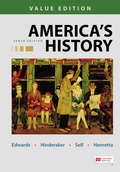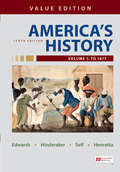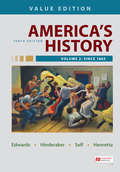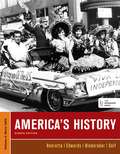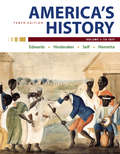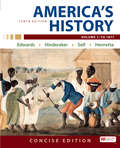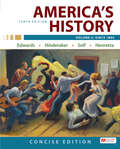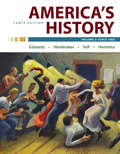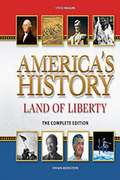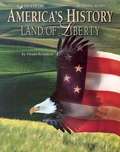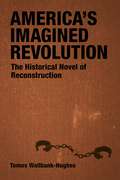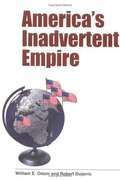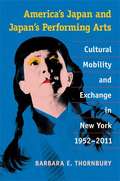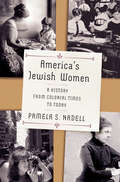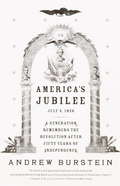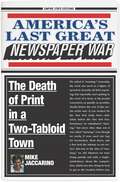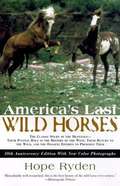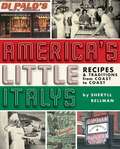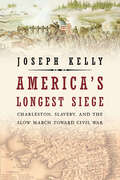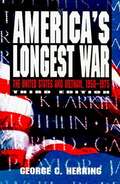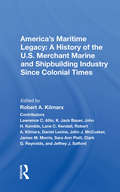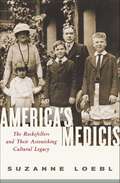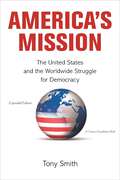- Table View
- List View
America's History, Value Edition, Combined Volume: 2 Books Set
by Rebecca Edwards Eric Hinderaker James Henretta Robert SelfAmerica’s History explains WHY events occurred, not just when. Students are provided an analytical and big-picture approach to American history in an affordable format.
America's History, Value Edition, Volume 1: 2 Books Set
by Rebecca Edwards Eric Hinderaker James Henretta Robert SelfAmerica’s History explains WHY events occurred, not just when. Students are provided an analytical and big-picture approach to American history in an affordable format.
America's History, Value Edition, Volume 2: 2 Books Set
by Rebecca Edwards Eric Hinderaker James Henretta Robert SelfAmerica’s History explains WHY events occurred, not just when. Students are provided an analytical and big-picture approach to American history in an affordable format.
America's History, Vol II (Eighth Edition)
by James A. Henretta Rebecca Edwards Robert O. SelfHelp your students think historically Known for its interpretive voice and thoughtful analysis, America's History models exactly the kind of thinking and writing students need to be successful. An accessible and balanced narrative with built-in primary sources and skills-based pedagogy gives students practice in thinking historically, and features new ways of mastering the content so that students come to class prepared.
America's History, Volume 1
by Rebecca Edwards Eric Hinderaker James Henretta Robert SelfAmerica’s History explains WHY events occurred, not just when. Students are provided an analytical and big-picture approach to American history with a plethora of support tools to help determine what’s most important.
America's History, Volume 1: Concise Edition
by James A. Henretta Rebecca Edwards Robert O. Self Eric HinderakerAmerica�s History explains WHY events occurred, not just when. Students are provided an analytical and big-picture approach to American history with a plethora of support tools.
America's History, Volume 2: Concise Edition
by James A. Henretta Rebecca Edwards Robert O. Self Eric HinderakerAmerica�s History explains WHY events occurred, not just when. Students are provided an analytical and big-picture approach to American history with a plethora of support tools.
America's History, Volume 2: To 1877
by Rebecca Edwards Eric Hinderaker James Henretta Robert SelfAmerica’s History explains WHY events occurred, not just when. Students are provided an analytical and big-picture approach to American history with a plethora of support tools to help determine what’s most important.
America's History: Land of Liberty
by John L. Esposito Vivian Bernstein Steck-Vaughn Staff Mel MillerAs you go through this book, you will discover how people created a new nation in North America that was different from any other country. Every chapter starts with statements made to encourage readers in the units and chapters. There are questions presented at the beginning of every chapter that help students to focus on the main ideas throughout the book.
America's History: Land of Liberty
by Vivian BernsteinAmerica's early Years, From Colonies to a Nation, The Nation grows and Changes, The Civil War and Reconstruction, The United States becomes an Industrial Nation, The United States as a World Power, The Great Depression and World War II, The Years after World War II, The United States Today and Tomorrow.
America's History: Land of Liberty, Beginning to 1877
by Vivian BernsteinAs you read America's History: Land of Liberty, you will discover how people created a new nation in North America that was different from any other country. That nation, the United States of America, was the only nation at the end of the 1700s where people made their own laws and ruled themselves without a king or queen. It was a great experiment because no one knew if a nation with such a government could survive. You will learn how the new nation not only survived, but grew larger and stronger.
America's Imagined Revolution: The Historical Novel of Reconstruction (Southern Literary Studies)
by Tomos Wallbank-HughesAmerica’s Imagined Revolution explores the Reconstruction period after the Civil War to ask narratological, historiographical, and theoretical questions about how slave emancipation has (and has not) been theorized as revolution. Reading historical fiction by authors such as George Washington Cable, Albion Tourgée, Charles Chesnutt, Frances Harper, and W. E. B. Du Bois in dialogue with nineteenth-century historical writing—and the era’s legal, political, and print culture—Tomos Wallbank-Hughes excavates an evanescent form of historicist writing sensitive to the revolutionary changes that shaped life in the emancipation-era South.As an aesthetic form, the historical novel of Reconstruction poses questions about revolutionary experience in plantation societies, and in the process challenges critical assumptions about historical time in the nineteenth century: How do authors narrate epochal change that also feels like retrenchment? In what direction does history travel if it does not progress? What narratives of race, class, and region encompass both continued domination and ruptured power? By plumbing the situations that give it form, the historical novel of Reconstruction provides a window into the literary culture of the South’s long nineteenth century in which, rather than a storehouse of tradition, the region became a terrain for interpreting social revolution and uncovering slavery’s revolutionary afterlives.America’s Imagined Revolution offers a new interpretation of the literary and historiographical significance of the Reconstruction period and its relationship to American literary history.
America's Inadvertent Empire
by William E. Odom Robert DujarricThe United States finds itself at the center of an empire of a new type, wealth-generating and voluntary, not a traditional imperial system, say the authors of this compelling book. William E. Odom and Robert Dujarric examine America's unprecedented power within the international arenas of politics, economics, demographics, education, science, and culture. They argue persuasively that the major threat to this unique empire is ineffective U. S. leadership, not a rising rival power center. America cannot simply behave as an ordinary sovereign state, Odom and Dujarric contend. They describe the responsibilities that accompany staggering power advantages, and they explain that resorting to unilateralism makes sense only when it becomes necessary to overcome paralysis in multilateral organizations. The authors also offer insights into the importance of liberal international institutions as a source of power, why international cooperation pays, and why spreading democracy often inhibits the spread of constitutional order. If the United States uses its own power constructively, the authors conclude, the American empire will flourish for a long time. Book jacket.
America's Japan and Japan's Performing Arts: Cultural Mobility and Exchange in New York, 1952-2011
by Barbara E. ThornburyAmerica’s Japan and Japan’s Performing Arts studies the images and myths that have shaped the reception of Japan-related theater, music, and dance in the United States since the 1950s. Soon after World War II, visits by Japanese performing artists to the United States emerged as a significant category of American cultural-exchange initiatives aimed at helping establish and build friendly ties with Japan. Barbara E. Thornbury explores how “Japan” and “Japanese culture” have been constructed, reconstructed, and transformed in response to the hundreds of productions that have taken place over the past sixty years in New York, the main entry point and defining cultural nexus in the United States for the global touring market in the performing arts. Thornbury crosses disciplinary boundaries in her wide range of both primary sources and published scholarship, making the book of interest to students and scholars of performing arts studies, Japanese studies, and cultural studies.
America's Jewish Women: A History From Colonial Times To Today
by Pamela NadellA groundbreaking history of how Jewish women maintained their identity and influenced social activism as they wrote themselves into American history. What does it mean to be a Jewish woman in America? In a gripping historical narrative, Pamela S. Nadell weaves together the stories of a diverse group of extraordinary people—from the colonial-era matriarch Grace Nathan and her great-granddaughter, poet Emma Lazarus, to labor organizer Bessie Hillman and the great justice Ruth Bader Ginsburg, to scores of other activists, workers, wives, and mothers who helped carve out a Jewish American identity. The twin threads binding these women together, she argues, are a strong sense of self and a resolute commitment to making the world a better place. Nadell recounts how Jewish women have been at the forefront of causes for centuries, fighting for suffrage, trade unions, civil rights, and feminism, and hoisting banners for Jewish rights around the world. Informed by shared values of America’s founding and Jewish identity, these women’s lives have left deep footprints in the history of the nation they call home.
America's Journey: Continuity and Change in the Twentieth Century
by David Goldfield Carl Abbott Virginia Dejohn Anderson Jo Ann E. Argersinger Peter H. Argersinger William L. Barney Robert M. WeirA number of features in this book are designed to aid in the study of history. Each chapter begins with Questions, organized by the main subtopics of each chapter, that encourage careful consideration of important themes and developments.
America's Jubilee: A Generation Remembers the Revolution After 50 Years of Independence
by Andrew BursteinIn America's Jubilee distinguished historian Andrew Burstein presents an engrossing narrative that takes us back to a pivotal year in American history, 1826, when the reins of democracy were being passed from the last Revolutionary War heroes to a new generation of leaders. Through brilliant sketches of selected individuals and events, Burstein creates an evocative portrait of the hopes and fears of Americans fifty years after the Revolution. We follow an aged Marquis de Lafayette on his triumphant tour of the country; and learn of the nearly simultaneous deaths of John Adams and Thomas Jefferson on the 4th of July. We meet the ornery President John Quincy Adams, the controversial Secretary of State Henry Clay, and the notorious hot-tempered General Andrew Jackson. We also see the year through the eyes of a minister's wife, a romantic novelist, and even an intrepid wheel of cheese. Insightful and lively, America's Jubilee captures an unforgettable time in the republic's history, when a generation embraced the legacy of its predecessors and sought to enlarge its role in America's story.
America's Last Great Newspaper War: The Death of Print in a Two-Tabloid Town
by Mike JaccarinoNAMED A BEST BOOK OF THE WEEK BY THE NEW YORK POSTALSO AVAILABLE AS AN AUDIOBOOKA from-the-trenches view of New York Daily News and New York Post runners and photographers as they stop at nothing to break the story and squash their tabloid arch-rivals.When author Mike Jaccarino was offered a job at the Daily News in 2006, he was asked a single question: “Kid, what are you going to do to help us beat the Post?” That was the year things went sideways at the News, when the New York Post surpassed its nemesis in circulation for the first time in the history of both papers. Tasked with one job—crush the Post—Jaccarino here provides the behind-the-scenes story of how the runners and shooters on both sides would do anything and everything to get the scoop before their opponents.The New York Daily News and the New York Post have long been the Hatfields and McCoys of American media: two warring tabloids in a town big enough for only one of them. As digital news rendered print journalism obsolete, the fight to survive in NYC became an epic, Darwinian battle. In America’s Last Great Newspaper War, Jaccarino exposes the untold story of this tabloid death match of such ferocity and obsession its like has not occurred since Pulitzer– Hearst.Told through the eyes of hungry “runners” (field reporters) and “shooters” (photographers) who would employ phony police lights to overcome traffic, Mike Jaccarino’s memoir unmasks the do-whatever-it-takes era of reporting—where the ends justified the means and nothing was off-limits. His no-holds-barred account describes sneaking into hospitals, months-long stakeouts, infiltrating John Gotti’s crypt, bidding wars for scoops, high-speed car chases with Hillary Clinton, O.J. Simpson, and the baby mama of a philandering congressman—all to get that coveted front-page story.Today, few runners and shooters remain on the street. Their age and exploits are as bygone as the News–Post war and American newspapers, generally. Where armies once battled, often no one is covering the story at all.Funding for this book was provided by: Furthermore: a program of the J. M. Kaplan Fund
America's Last Wild Horses
by Hope RydenFrom the Book Jacket: "A richly researched and written book with an unusual appeal." -Publishers Weekly "This book is a treat for everyone who knows or cares about horses." -Cleveland Amory No wild animal captures the spirit of North America quite so powerfully as the wild horse-nor has any faced such diverse and potent enemies. In this provocative account, Hope Ryden-who helped to ensure the passage of the Wild and Free-Roaming Horse and Burro Act, which grants mustangs special protection-combs the history of these proud and noble horses; Descended from the Spanish horses ridden by the conquistadors, they evolved into the tough and intelligent ponies that Indians-and later, explorers and cowboys-learned to rely on. From the period when wholesale extermination of the buffalo was underway until recent times, commercial and political interests have sought to eliminate the wild horses as varmints. In the latest update to this classic story Ryden tells of the successes: and failures in the past ten years of regulation, and has added stunning new color photographs. The subject of a front-page article in The New York Times. when it was first published, america's last wild horses continues to be a compelling testament to the life of a uniquely American symbol of grace and wildness, and is a must read for horse lovers and Western history enthusiast everywhere.
America's Little Italys: Recipes and Traditions from Coast to Coast
by Sheryll BellmanThe Italian Immigrant Experience Who could ever imagine a life without opera, pizza, or great art? These wonderful contributions of Italian culture have greatly influenced the American cultural landscape. During the nineteenth century, Italian immigrants came to the United States to forge a better, safer, and more prosperous life. They brought with them rich traditions that included love for romance, literature, science, commerce, style, and of course, most notably -- food.
America's Longest Siege: Charleston, Slavery, and the Slow March Toward Civil War
by Joseph Kelly“[A] vivid and engrossing study of slavery in and around one of its trading hubs, Charleston, SC . . . an important contribution to Southern antebellum history.” —Library JournalIn America’s Longest Siege, historian Joseph Kelly captures the toxic mix of nationalism, paternalism, and wealth that made Charleston the center of the nationwide debate over slavery and the tragic act of secession that doomed both the city and the South. Thoroughly researched and compulsively readable, America’s Longest Siege offers a new take on the Civil War and the culture that made it inevitable.“Lays bare the decades-long campaign of rationalization and intimidation that revivified and reinforced the institution of slavery and dragged the United States into disunion and civil war . . . this masterful study is a timely and important reminder of the consequences that result when ideological extremists succeed in drowning out the voices of reason.” —Peter Quinn, author of Hour of the Cat
America's Longest War: The United States and Vietnam, 1950-1975 (3rd edition)
by George C. HerringAmericas Longest War provides a complete and balanced history of the Vietnam War. It is not mainly a military history, but seeks to integrate military, diplomatic, and political factors in order to clarify America's involvement and ultimate failure in Vietnam.
America's Maritime Legacy: A History Of The U.s. Merchant Marine And Shipbuilding Industry Since Colonial Times
by Robert A. KilmarxThis book presents a comprehensive historical analysis of merchant shipping on the high seas and associated shipbuilding under sovereign U.S. jurisdiction from precolonial times to the present. It identifies U.S. policy developments that have affected the merchant marine and shipbuilding industries.
America's Medicis: The Rockefellers and Their Astonishing Cultural Legacy
by Suzanne LoeblFrom literary polymath Suzanne Loebl (the author of ten books, most recently the acclaimed America’s Art Museums) comes the captivating, first-of-its kind exploration into the philanthropic and cultural legacy of one of America’s wealthiest and most influential families: The Rockefellers. Fueled by John D. Rockefeller’s vast petroleum fortune, the entire family’s terrific passion for the arts transformed the artistic infrastructure of twentieth century America. Funding museums like the MoMA, the Cloisters, the Metropolitan Museum of Art, the Museum of the Oriental Art at the University of Chicago, and commissioning major architectural projects like Rockefeller Center, Riverside Church, and Lincoln Center, the Rockefellers’ achievements forever changed the cultural landscape of the Western world. Loebl’s penetrating biography is the first book to deeply explore the family’s critical role as collectors and patrons of the arts.
America's Mission: The United States and the Worldwide Struggle for Democracy - Expanded Edition (Princeton Studies in International History and Politics #139)
by Tony SmithAmerica's Mission argues that the global strength and prestige of democracy today are due in large part to America's impact on international affairs. Tony Smith documents the extraordinary history of how American foreign policy has been used to try to promote democracy worldwide, an effort that enjoyed its greatest triumphs in the occupations of Japan and Germany but suffered huge setbacks in Latin America, Vietnam, and elsewhere. With new chapters and a new introduction and epilogue, this expanded edition also traces U.S. attempts to spread democracy more recently, under presidents Clinton, Bush, and Obama, and assesses America's role in the Arab Spring.
